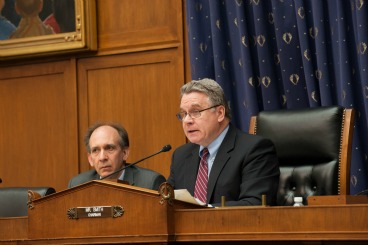Mr. Speaker, I rise today to introduce H.R. 5961, the Iraq and Syria Genocide Relief and Accountability Act of 2016. Since ISIS’ blitzkrieg across the multiethnic and religiously diverse mosaic of eastern Syria and western Iraq in 2014, I have chaired four hearings focused on the implications of this appalling advance for religious and ethnic minorities in those areas. Events in the region and the expert testimony of witnesses quickly revealed that ISIS was not merely focused on territorial conquest—the group was ideologically committed to exterminating ancient religious communities and cleansing its self-proclaimed caliphate of anything but its vicious and fundamentalist interpretation of Islam. Many of my colleagues and I were certain early on that ISIS was committing genocide. We pressed the Administration to formally acknowledge that fact until the Secretary of State did so in March of this year. But the most pressing question issue has always been the lives of those religious minorities right now that face extinction under this tyranny of terror.
The Iraq and Syria Genocide Relief and Accountability Act of 2016 is an answer to the question of what the United States can do to mitigate this suffering, save lives, and build a more sustainable future for Syria and Iraq. The bill tackles this overwhelming challenge on three fronts by directing the Administration to take additional measures to improve the lives of displaced genocide survivors, provide some of them with an additional lifeline to escape their war torn lands, and support efforts that will help preserve the presence of religious minority communities in those areas for years to come.
In a hearing this May that I chaired called “The ISIS Genocide Declaration: What Next?” Carl Anderson, Supreme Knight of the Knights of Columbus—who has been a leader in drawing attention to the plight of Christians in this conflict—testified that “Repeatedly we hear from Church leaders in the region that Christians—and other genocide survivors—are last in line for assistance from governments.” We can and must do better. To that end, H.R. 5961 requires the Administration to assess and address the humanitarian vulnerabilities, needs, and triggers to flee, of religious and ethnic communities that were targeted for genocide or otherwise severely persecuted. It directs the Administrations to fund entities that are effectively providing assistance to these communities and guarantees that faith-based organizations on the ground are not excluded from U.S. assistance.
One such example is the Chaldean Catholic Archdiocese of Erbil, which provides assistance to internally displaced families of Yezidis, Muslims, and Christians, including food and resettlement from tents to permanent housing, as well as rental assistance, for Yezidis, medical care and education to Yezidis and Muslims through its clinics, schools, and university – which are open to everyone. The Archdiocese provides some form of each of these kinds of assistance to all of the estimated 10,500 internally displaced Christian families in the greater Erbil region. Yet as it provides these critical services, it has not received a single penny from any government. H.R. 5961 is clear that the Administration must be supporting entities, regardless of whether they are faith-based, that are heroically providing assistance to genocide survivors on the ground.
In recognition of the extraordinary suffering of these religious and ethnic communities, and their extraordinary vulnerability to persecution, H.R. 5961 requires the Administration to create a Priority Two, or “P-2,” visa category of special humanitarian concern that would provide one additional avenue for genocide survivors to seek resettlement in the United States through the U.S. Refugee Admissions Program. It is important to note that this is not a “fast track” to resettlement—P-2 applicants undergo the same security screening as all refugee applicants. But this special category allows them to access an overseas interview wherever the United States interviews refugee applicants, without needing a referral from the UN, an NGO, or a US Embassy, as is usually the case.
This bill also addresses a critical factor that will influence the continued presence of smaller, vulnerable religious communities in Syria and Iraq beyond this conflict: accountability for those who perpetrate heinous crimes against them. H.R. 5961 directs the Administration to prioritize supporting the criminal investigation, prosecution, and conviction of perpetrators of genocide, crimes against humanity, and war crimes. These efforts will be focused on funding and supporting entities that are conducting criminal investigations, building Syrian and Iraqi investigative and judicial capacity, or collecting and preserving evidence for eventual use in domestic courts, hybrid courts, or internationalized domestic courts. Whether they are members of the Asad regime, ISIS, or some of the Popular Mobilization Brigades in Iraq, there can be no impunity for individuals who committed these dreadful crimes.
H.R. 5961 also directs the Administration to identify gaps in our criminal statutes to facilitate the prosecution of American perpetrators, and non-Americans present in the United States, of crimes against humanity and war crimes.
Without accountability, without humanitarian assistance reaching these religious and ethnic communities, we risk losing the invaluable, ancient presence of these communities in these countries altogether. This will feed violent extremism and dim the future of Iraq and Syria.
I urge my House colleagues to support this measure that will deliver immediate assistance to genocide survivors, help prosecute and punish perpetrators, and invest in a sustainable future for these persecuted religious and ethnic communities in the lands in which they have lived for so many generations.









